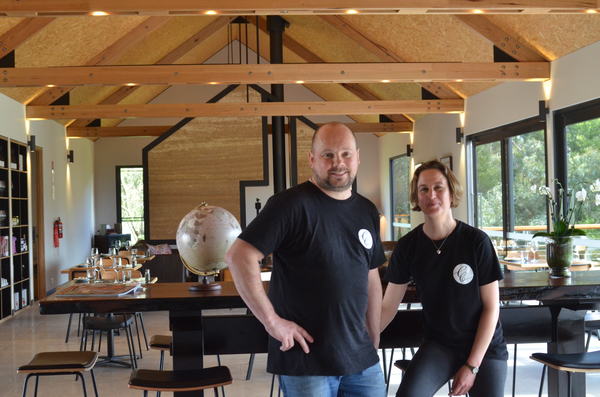By Casey Neill
A TYNONG North vineyard is showcasing its wine in a new space with new sidekicks – French cuisine and the best of Gippsland produce.
Husband and wife team Patrick and Kirsten Hardiker have run Cannibal Creek since 1997.
“For a long time we’ve been planning to do something like this – somewhere where people could sit and enjoy some food with their wine, and where we could showcase other Gippsland produce as well, not just our own,” Kirsten said.
They started construction in February last year and opened the doors in March this year.
“We’ve got a full commercial kitchen, restaurant, and a cellar room downstairs – we hope to use that as another tasting area and a place for foodie workshops,” she said.
There’s a deck for the summer time, a fireplace for the cooler months, and a private dining space for family groups or meetings.
“The premium wines we make are really fantastic with food,” Kirsten said.
“It’s giving that whole experience, I think.
“I think people are looking for more these days, too.
“They want to be able to go out and have a lunch and make a day of it.
“We’ve been beautifying Cannibal Creek, which is our eastern boundary.
“People can walk past the boundary and up to the creek. You can spend a day or half a day with the family.”
The move is all about tapping into wine tourism.
“The wine industry is quite challenging, it’s been very competitive,” Kirsten said.
“It’s taken us a while to get to the point where we were able to make this transition.”
A single slab of jarrah forms the bar, a steel-framed hemp fireplace wall surrounds the double-sided cast iron fireplace, and hand-blown glass pendant lights hang from the high ceilings.
Karine Saille manages front of house and French chef Philippe Desrettes shows his roots in the cuisine.
“The style of our wines – the quality and structure – go really well with French food,” Kirsten said.
The vines take up five hectares and include sauvignon blanc, chardonnay, pinot noir, cabernet sauvignon and merlot varieties.
“We make a sparkling from our chardonnay,” Kirsten said.
“And we make a liqueur from our pinot.”
She said the vineyard was becoming a point where friends and family from Gippsland, Melbourne, Peninsula, and Yarra Valley could meet in the middle.
“We’re only a couple of kilometres from the highway and we’re less than an hour from Melbourne,” she said.
“We’re quite accessible.
“It’s right at the beginning of Gippsland. It’s a really good starting point for people.
“We want to build on our information for other things to do.
“We have a selection of wines from other vineyards in Gippsland, so we’re drawing people down to these other venues as well.
“The more we offer in the area, it will become a destination.
“We want people to keep coming back.
“Gippsland’s so big. There’s loads of different experiences.
“We’ve just got to tell people about it.”
As well as local wines, Cannibal Creek is showcasing produce from Gippsland, from Jindi Pig pork to beef and lamb from a Garfield butcher, cheese from Tarago River Cheese Company in Neerim South, beer and cider from Mirboo North and Officer, and Cannibal Creek Bakery bread.
“Everything we can possibly get locally,” Kirsten said.
“It’s all here – the best cheese, meat and fresh produce.”
The 100-acre Cannibal Creek Vineyard was originally a dairy farm.
“My husband’s parents bought the farm back in ’88,” Kirsten said.
“They were just running some beef cattle.”
Kirsten and Pat were living in Western Australia’s wine heartland.
“They asked us if we wanted to go in on some sort of business,” she said.
They loved wine and naively came up with a plan to grow grapes and sell them, before deciding that going the whole hog and producing wine was the way to go.
Pat’s background was in the building industry – which came in handy during construction – and he’s a self-taught winemaker and viticulturist.
“It’s all in the growing, understanding your soils and vines,” he said.
He said the vineyard’s terroir was the foundation of its success.
“It starts with our granite soils; this influences the approach to our viticulture, winemaking and the wines themselves,” he said.
“The granite soils are also responsible for the elegant, mineral and flinty characters of our wines.
“We have recently had our soil biology and chemistry analysed to help us understand this better.
“We are now applying biodynamic compost teas and a mixture of seaweed and fish emulsion to restore the soils back to optimum health.
“This allows the transaction of nutrients between the soil and the vine to work at its most efficient, culminating into the best quality grapes.”
The Hardikers say learning the best way to respond to the different seasons and weather conditions is a constant process.
This might mean irrigation in dryer years with minimum leaf and fruit removal to protect the fruit from the harsh sun.
Cooler seasons need the opposite approach – an open canopy to expose the fruit to as much sun as possible.
Cannibal Creek took out nine awards at the annual French Australian Chamber of Commerce and Industry Wine Show Le Concours des Vins de Victoria in December 2014.
The Cannibal Creek Chardonnay 2010 claimed a gold medal and was declared Best Open Class Chardonnay, Best White Wine of the Show and Best Wine of the Show.
Cannibal Creek Pinot Noir 2012 and 2013 also received gold medals and three further medals were awarded for the Chardonnay 2009, Pinot Noir 2010 and Cabernet Merlot 2013.
For the past 11 years the vineyard has supplied the members’ reserve sauvignon blanc for the Melbourne Cricket Club.
The vineyard’s cuvée this year received four stars in Tyson Stelzer’s Australian Sparkling Wine Report.







